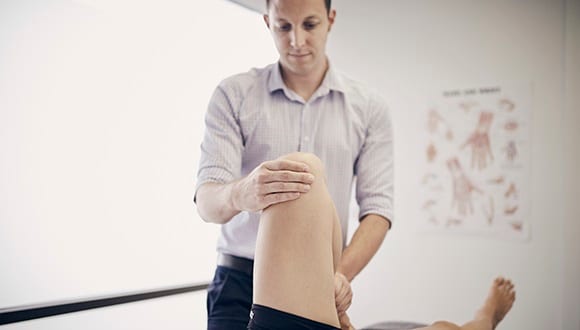Knee replacement: what you need to know
A knee replacement can be a daunting prospect, but it could give you a new lease on life.
Health Agenda magazine
April 2018
With 2.1 million Australians suffering from osteoarthritis, some of us may need to consider a knee replacement at some point in our life. In 2014–15 there were 52,039 hospitalisations for knee replacements in Australian hospitals, 69% were for privately-funded patients.
Joint disease osteoarthritis is the main cause of pain leading to a knee replacement. A serious injury previously sustained in the joint can also be a contributing factor.
For those with knee arthritis or a series of knee injuries, “The main symptoms are pain, swelling and deformity, and your quality of life is being impacted or restricted,” says Melbourne knee surgeon Nigel Hartnett.
These symptoms can have significant effects on your lifestyle and ability to perform everyday activities.
You may also have problems getting into and out of your car, climbing stairs, and sitting or walking for long periods of time. These effects can be debilitating, but doesn’t necessarily mean you need surgery.

Alternatives to knee surgery
Hartnett encourages his patients to try all other treatment options before committing to the operation.
“As a general rule I’ll try to exhaust all non-surgical measures first. I rarely book a knee replacement on the initial consult, because there is normally something they haven’t done,” he says.
Non-surgical options include physiotherapy, pain medication and anti-inflammatories. Weight loss can also help as your risk of osteoarthritis is twice as high if you’re overweight, and 4 times higher if you’re obese.
HCF members with medically diagnosed osteoarthritis (who’ve held HCF hospital cover for at least 12 months and cover for joint replacement surgery for at least two months) can access the 18-week Osteoarthritis Healthy Weight for Life program*. It’s designed to help you lose weight and build strength, which can help to stabilise your joints.
The aim is to delay having surgery for as long as possible so if you do need a new knee it will last you for the rest of your life, saving you future pain, expense and inconvenience.
“The longer you can delay, the better,” says Hartnett.
The good news is that if you do need a replacement, the longevity of the implants has continued to improve over time. “The metal and plastic bits, the way they’re fixed to the bone, the techniques, technology used to put them in, rehabilitation and aftercare have improved dramatically,” says Dr Keene, knee surgeon at Sportsmed SA.
The knee replacement operation
The procedure involves making several cuts into the leg and replacing either the whole knee joint with prostheses or, in a partial knee replacement, 1 or 2 of the 3 components of the knee. It can be performed under a general anaesthetic or a local anaesthetic with sedation.
Recovering from knee surgery
After the operation, the healing process can take up to 12 months, although the recovery time and amount of physiotherapy necessary can vary enormously from person to person, says Hartnett. You’ll be given medication to keep pain at a manageable level, and your pain should decrease in the first few days after surgery.
“I get my patients up, generally speaking, within 4–6 hours of having their operation,” he says. “Day 3 or 4 my patients will usually go home, with physio in the home.”
Whether you have rehab at home or in a rehabilitation facility may depend on a number of factors, including your age, level of support and living situation.
“If people live alone and don’t have a lot of family support, then I would recommend they go to rehab. It’s really up to the patient if they want to go home and do physio in-home, or to have rehabilitation for around 14 days post-surgery.”
The outcomes are similar whether you choose to do the rehab in hospital or as an outpatient.
Related articles
ARTHRITIS: DON’T IGNORE ACHES AND PAINS
Arthritis often starts with joint pain and stiffness so don’t ignore mystery pangs, particularly in your hands, hips or knees.
KNEE SURGERY ALTERNATIVES
Knee replacement surgery may not be the best solution for painful osteoarthritis.
LIVING WITH A CHRONIC DISEASE
Being diagnosed with a chronic illness can be an emotional and challenging time, but your mindset can have an impact on how you cope.
IS RUNNING GOOD FOR YOU?
Depending on who you ask, running will either add years to your life or age you prematurely. Here are the facts.
IMPORTANT INFORMATION
This communication contains information which is copyright to The Hospitals Contribution Fund of Australia Limited (HCF). It should not be copied, disclosed or distributed without the authority of HCF. Except as required by law, HCF does not represent, warrant and/or guarantee that this communication is free from errors, virus, interception or interference. All reasonable efforts have been taken to ensure the accuracy of material contained on this website. It’s not intended that this website be comprehensive or render advice. HCF members should rely on authoritative advice they seek from qualified practitioners in the health and medical fields as the information provided on this website is general information only and may not be suitable to individual circumstances or health needs. Please check with your health professional before making any dietary, medical or other health decisions as a result of reading this website.
* Eligibility criteria applies. For more information see hcf.com.au/hwfl